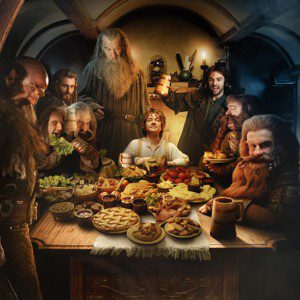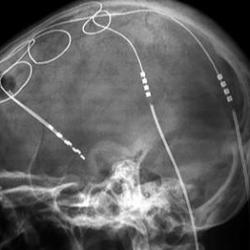There is a lot of debate as to whether or not Jesus was fully divine and fully human. Add this to the debate: perhaps he was a hobbit. After all, food and drink were such vital features of his life and work, as with Frodo, Sam, Merry, Pippin, and the other halflings.
As one spans Jesus’ life, it almost reads as if he enjoyed hobbit-like first and second breakfasts, afternoon tea, dinner, and related forms of culinary merriment (See this video clip). Jesus turned water into wine (John 2:1-12). He multiplied loaves of bread and fish in dramatic fashion (other than the resurrection, it is the only miracle documented in all four canonical gospels: Matthew 14:13-21; Mark 6:30-44; Luke 9:10-17; John 6:1-15). He loved to party, even eating with tax collectors and sinners to the chagrin of the religious establishment (Matthew 9:10-12). The Last Supper and the Lord’s Supper shape the church’s imagination not just during Holy Week but throughout the year, and point forward to the Marriage Supper of the Lamb (Revelation 19:6-10).
Jesus’ ministry also took us back in time to the Exodus. God delivered Israel from slavery in Egypt and led them to the Promised Land, sustaining them with manna in the wilderness (See Exodus 16). NT Wright references the Exodus in his article on The Lord’s Prayer, which includes the Lord’s call to pray for our daily bread (Matthew 6:9-13; see Wright’s “The Lord’s Prayer as a Paradigm of Christian Prayer”). Like Israel following the Exodus from Egypt, Jesus was in the wilderness (for forty days and nights; Israel was in the wilderness for forty years).
Like Israel, Jesus was hungry; but he did not put the Lord God to the test (as Israel did; see Exodus 16 and Numbers 11). He did not turn stones into bread, but rather depended on God to care for his needs (Matthew 4:1-4; see also Deuteronomy 8:1-20). In the Lord’s Prayer, Jesus exhorted his followers to look to God for their daily sustenance, even as he later fed the multitudes, reminding readers of God’s provision through Moses (Matthew 6:9-13; Matthew 14:13-21).
The New Exodus has begun in and through Jesus. He delivers people from bondage to sin and oppression. Wright comments on the prayer clause, “Give us today our daily bread”:
The prayer for bread has its historical background in the provision of manna in the wilderness. God’s daily gift, following the people’s grumbling, became the stuff of legend. Jesus’ actions in the feeding miracles alluded to the wilderness stories, as the evangelists (especially John) suggest. In the context of the Lord’s Prayer, this clause aligns the followers of Jesus with the wilderness generation and their need to know God’s daily supply of not only literal bread but also of all that it symbolized.
Manna was not needed in Egypt. Nor would it be needed in the promised land. It is the food of inaugurated eschatology, the food that is needed because the kingdom has already broken in and because it is not yet consummated. The daily provision of manna signals that the Exodus has begun, but also that we are not yet living in the land.[1]
The Promised Land, like Eden, like the garden city in the kingdom of God envisioned in Revelation, is a place where God’s shalom prevails. Like the Shire where hobbits reside, it is a place of abundant provision. But as Wright indicates, we are not there yet. We are on the way. And so, we need to know that God will take care of our needs as we make our way in fellowship with Jesus through dangerous terrain to Mordor and back again. And so, we pray “Give us today our daily bread” (Matthew 6:11).
Whether or not Jesus was a hobbit, he understood our need for daily bread. What bearing does Jesus’ prayer, story and kingdom vision of shalom in the land have on such matters as food quality, quantity, cost, preparation, distribution, and the place of food in our lives in relation to God, people, and the environment? There’s more to follow on this subject in days to come, as we make our way to Saturday April 18th’s conference, “Food Fight: A Civil Dialogue over Our Daily Bread.”
[1]N. T. Wright’s piece “The Lord’s Prayer as a Paradigm of Christian Prayer” was originally published in Into God’s Presence: Prayer in the New Testament, ed. R.L. Longenecker (Grand Rapids, Eerdmans, 132-54), 2001.















